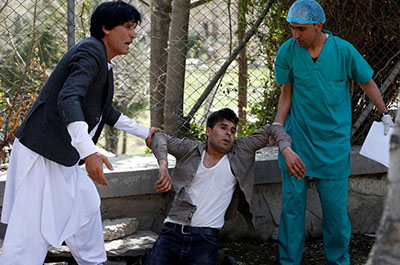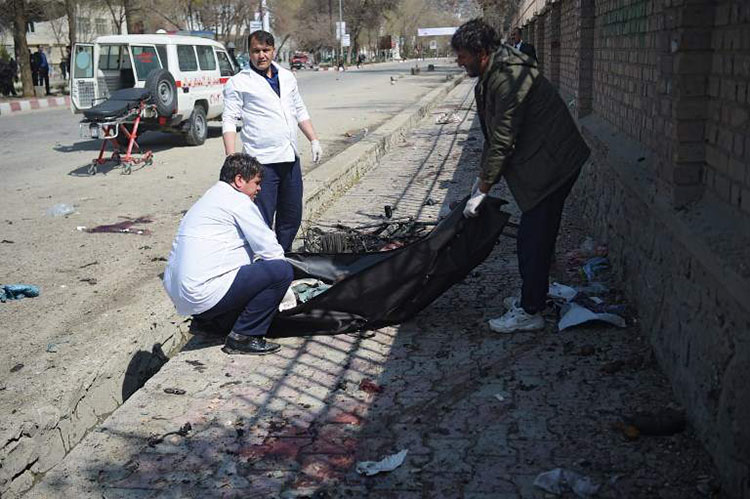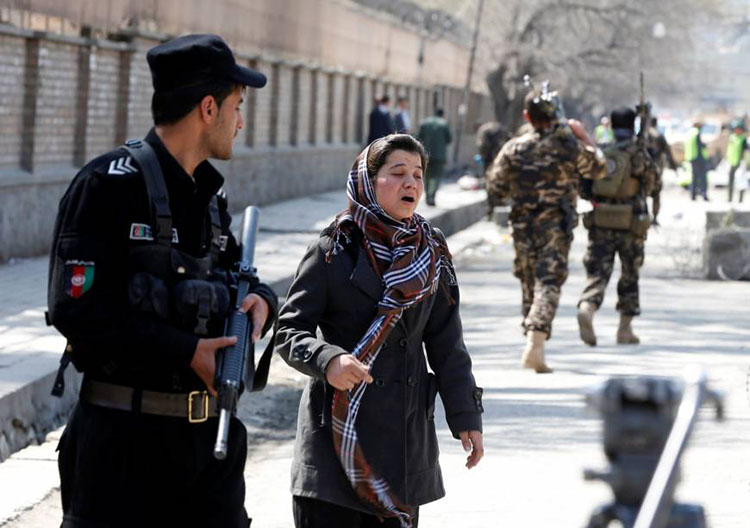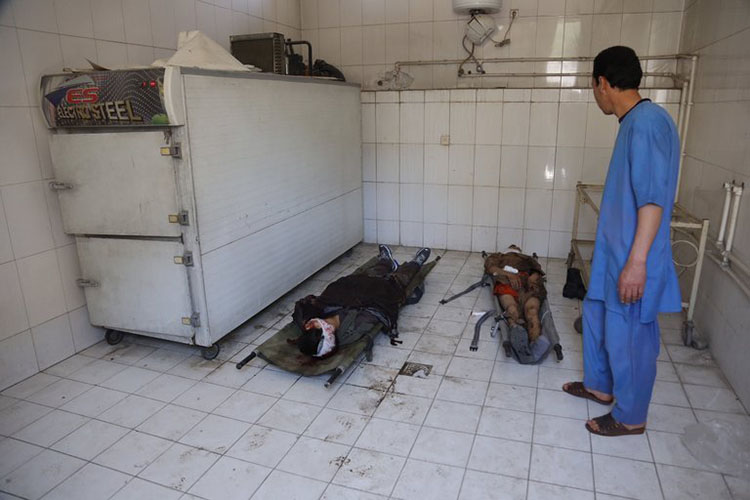By Fatima Faizi and Rod Nordland
KABUL, Afghanistan — A suicide bomber detonated explosives in a crowd celebrating the Persian New Year in Kabul, Afghanistan, on Wednesday, killing 31 and leaving desperate family members searching among bodies and body parts for their loved ones’ remains.
The victims were strewn around the courtyard in front of the Ali Abad Hospital in Kabul, where relatives preparing for burials tried grimly to match trunks with limbs or heads with trunks, and doctors searched for anyone with a pulse. While it was hard to know for sure, there were at least 10 dead just in that area, plus limbs, hands, and other pieces of flesh that were impossible to identify.

Afghan men mourn at a hospital compound after a suicide attack in Kabul on Mar. 21, 2018. Dozens of people were killed in the attack. (Photo: Omar Sobhani)
In one corner, lying face down on a staircase, was a boy named Mustafa of about 12, who at first glance looked alive. Then it was obvious that one of his legs was blown nearly off; a new black-and-white sneaker remained on the foot. His other leg was nowhere to be seen. For more than an hour no relatives appeared, until finally his mother and father arrived.
The father restrained his wife, trying to prevent her from seeing their son’s gruesome remains; she lashed out in anger. “Why are you alive?” she shouted at him. “Mustafa is dead, why are you alive?”
The bomber struck about noon Wednesday, according to Afghan government officials. The explosion happened right outside the hospital: The bomber was apparently stopped before reaching a Shiite shrine in the Kart-e Sakhi area of western Kabul, where much larger crowds had gathered.
Wahid Majrooh, the spokesman for the Ministry of Public Health, put the death toll at 31, with 65 others wounded.
The mother of Mustafa ripped off her head scarf in her grief, and rebuffed attempts by her husband and friends to put it back on. Beside herself, she engaged her dead son in desperate conversation. “Mustafa, why have you left me alone? You were so happy to celebrate Nowruz, you so wanted to go. You said to me, ‘Look mother, you don’t know about style. I have dressed up, and my shirt matches my shoes.’ ” The shirt was also black and white.
The Islamic State claimed responsibility for the bombing, according to a report on its website, Amaq, cited by the SITE Intelligence Group. The Islamic State in Khorasan, the group’s local affiliate, has repeatedly targeted Shiites in the Afghan capital over the past year, most recently on March 9, when 10 people were killed in a suicide bombing at a Shiite mosque complex. That blast set off protests by the Hazara minority, a long-oppressed ethnic group whose members are mostly Shiite.
In her soliloquy to her dead son, Mustafa’s mother reminded him of his sister, killed in an attack on the Kart-e Sakhi shrine last year. “When we lost Musqa, you came to me and you said, ‘Look mother, I am here, don’t worry, I am with you.’ But now, you are not, and what should I do without you?”
Judging from the survivors, the victims of Wednesday’s bombing were Sunnis, both Pashtuns and Tajiks, as well as Hazaras. Although the Sakhi shrine is mainly a Shiite institution, it had been regarded as a safe place because it was heavily guarded after the previous attacks on Hazaras. It had been a popular venue on Wednesday with many ethnic groups.
Nowruz is the beginning of the year on the Persian calendar, but it also serves as a celebration of the end of winter, the first day of spring and the beginning of the school year. It’s associated with outdoor festivities and picnics, usually with many children present; it is also a traditional time to try on new clothes, and many dress in their finest to promenade in the city.

The New York Times: Many of those in the courtyard were furious, yelling at journalists to leave, and denouncing political leaders. Doctors joined in the anger, yelling for blood, for more ambulances, for medicine. Many in the crowd repeatedly chanted “Death to Hekmatyar,” referring to Gulbuddin Hekmatyar, the insurgent leader who last year made peace with the government, but is widely remembered as the “Butcher of Kabul” for his Hezb-i-Islami group’s relentless shelling of Kabul in the 1990s. There is no indication that his group was involved in Wednesday’s bombing. (Photo defaced by RAWA)
In the courtyard of the hospital, one family arrived to find three members among the dead: an older woman in a pink traditional Hazara dress; a young man named Sajad, already in a body bag; and a boy of about 4 or 5. The boy wore a new red shirt, and his father, wearing old clothes, lifted him in his arms. He seemed too shocked for words or tears as he laid him in an ambulance beside Sajad, his older brother.
Another relative came and shook the young man’s corpse, saying, “Sajad, please stand up, why won’t you talk to me? What will I say to your mother?”
A fashionably dressed young woman, about 22 years old, her hands decorated with elaborate henna tattoos, mourned an older brother; doctors lifted a corner of the sheet covering him so she could identify him. She cried so hard that she ran out of tears, and began tearing her hair and scratching her face. “Lala jan,” she said, using the affectionate term for an older brother, “I want to come with you — I don’t want to be alive any longer.”
Many of those in the courtyard were furious, yelling at journalists to leave, and denouncing political leaders. Doctors joined in the anger, yelling for blood, for more ambulances, for medicine. Many in the crowd repeatedly chanted “Death to Hekmatyar,” referring to Gulbuddin Hekmatyar, the insurgent leader who last year made peace with the government, but is widely remembered as the “Butcher of Kabul” for his Hezb-i-Islami group’s relentless shelling of Kabul in the 1990s. There is no indication that his group was involved in Wednesday’s bombing.
Mustafa’s mother spent her ire on President Ashraf Ghani, with a maternal curse: “May God kill your own son so you will understand what it means to lose one.”
She looked confused when asked her name. “My name? I don’t remember my name, do I have a name?” Then she resumed screaming and cursing.
Her husband told her their younger son, Mujtaba, was on his cellphone. She composed herself and took the phone, telling Mujtaba not to worry, that his brother was still alive. “Mustafa is just in the hospital, they are operating on him now, and he’s O.K.” She hung up and burst into tears again. Some young boys who knew her children were nearby, and she scolded them fiercely. “Do not tell Mujtaba his brother is dead. I don’t want him crying, too.”
Suicide attacks are now one of the biggest killers of civilians in Afghanistan, according to United Nations figures. A spokesman for the Taliban, Zabihullah Mujahid, said his group had not been responsible for the latest attack; it has similarly denied any role in previous attacks on Shiite religious targets.
The mother of Mustafa wiped her tears away with both hands, readjusted her head scarf, and resumed speaking to her dead son: “You see, Mustafa, I am O.K. now. I am not crying, like you asked me not to do when Musqa died. I’m here now, why are you not here?”
“When you left this morning, you wanted to go to the Sakhi Jan shrine, and you said you wanted to pray for your future, for a better future, for the future of our family, for Afghanistan,” she added. “Oh my Mustafa. Now who will pray for you?”

People celebrate in a public park during Nowruz, Persian new year, in Kabul, March 21, 2018. (Photo: AP)

Photo: Shah Marai/AFP/Getty

Photo: Reuters

Photo: Rahmat Gul/AP

Photo: Mohammad Ismail/Reuters



